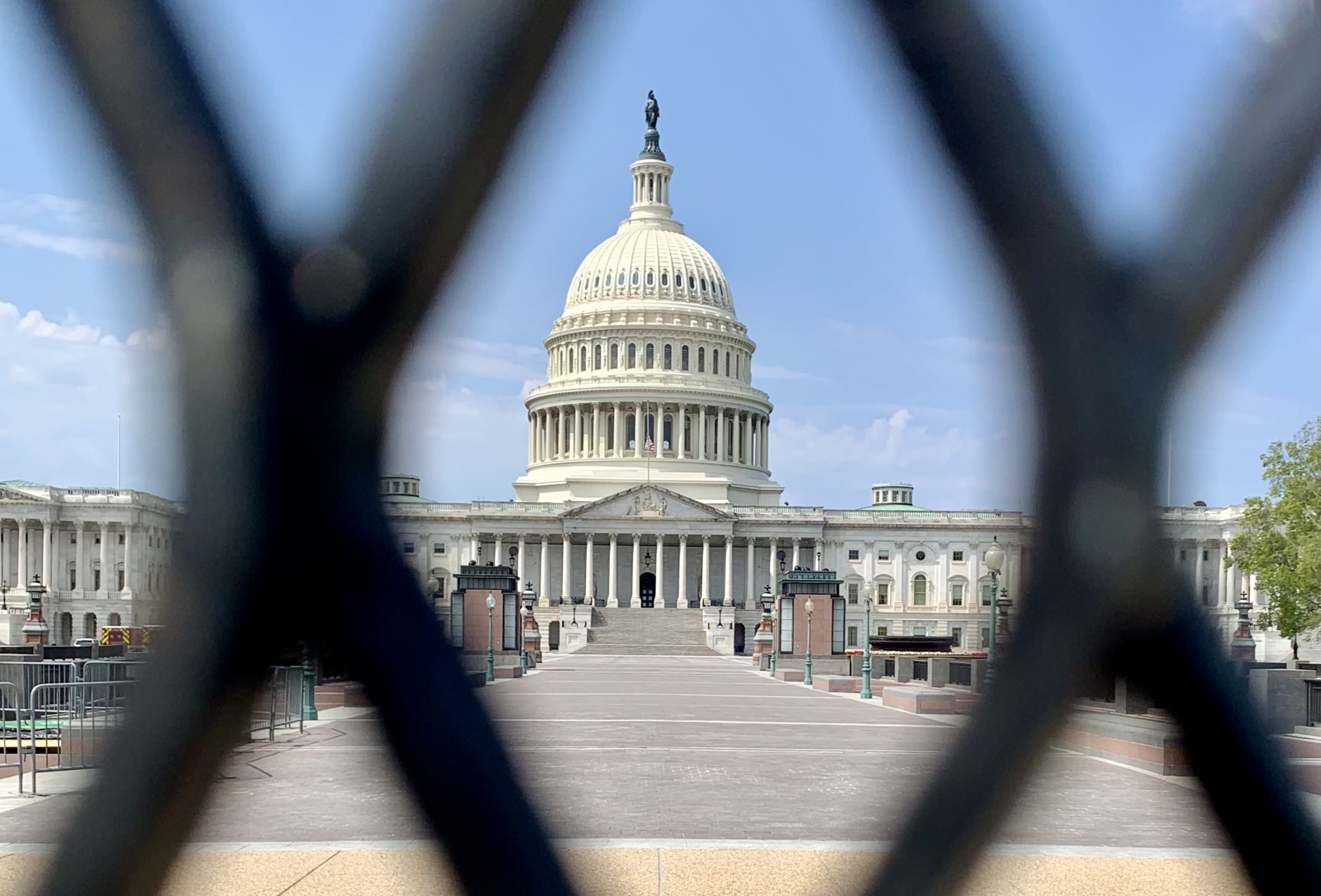Danny De Gracia: News Media Has A Responsibility In Lawmaking And Democracy
It’s not just our elected officials who need to shape up. Journalists frustrate democracy when they don’t provide details on how to take civic action.
December 23, 2024 · 8 min read

About the Author
Danny de Gracia is a resident of Waipahu, a political scientist and an ordained minister. Opinions are the author’s own and do not necessarily reflect Civil Beat’s views. You can reach him by email at dgracia@civilbeat.org or follow him on Twitter at @ddg2cb.
It’s not just our elected officials who need to shape up. Journalists frustrate democracy when they don’t provide details on how to take civic action.
Pop quiz: What is the bill number for the funding measure that prevented the federal government from shutting down Friday?
I’ll be honest with you, I didn’t know the answer to that either. I had to look it up.
On Saturday, President Joe Biden signed into law H.R. 10545, also known as “The American Relief Act, 2025.” But you wouldn’t know that from the vast majority of news reporting during the tight process to avert a government shutdown.
We heard about the infamous original “1,500-page bill,” (it was 1,547 pages to be exact) and the slimmer “Plan B” bill that was rejected. Almost always the for-profit media and political observers alike referred to these as “the budget bill,” “the omnibus spending package,” “the bill to prevent a shutdown,” “a three-month funding bill,” and so on.
Yeah, yeah, yeah, that’s all fine. The question I always have when I see this kind of reporting or online discussion is, “What’s the bill number so I can read it personally or contact the committee chair?” The for-profit media, both local and national, usually donʻt tell you the bill number.
To be fair, the bill number that contained the text for the budget bill changed several times. As best I can tell, on Tuesday it was H.R. 10445, “The Further Continuing Appropriations and Disaster Relief Supplemental Appropriations Act, 2025.”
Then after the House was pressured to slim it down, the bill became H.R. 10515, “Making further continuing appropriations for the fiscal year ending September 30, 2025, and for other purposes.”
Finally, when Biden signed the measure early Saturday, it was H.R. 10545, the “American Relief Act, 2025.”
Confused? You should be, and in fact, some of my friends on Capitol Hill tell me that’s exactly the intent. How would anyone outside of D.C. who isn’t intimately tracking this process be able to know what’s the current draft or what we’re supposed to be paying attention to?
It’s not like news outlets can’t tell you this information. Many of them were able to tell us the votes, which means they could have told us the bill.
As a former writer for a national paper, I’m not aware of any formal practice, at least when I was there, that told us, “don’t tell the people what the bill number is” or “hide relevant details.” But I do know that the downstream effects of reporting this way means the public is at a significant disadvantage because it has to rely on hot takes from TV pundits and various personalities on social media or shallow reporting from their trusted traditional media.
You can’t fight what you don’t see; you can’t support what you don’t know.

At the local level, whenever I hear the evening TV news reporting on something controversial at the City Council or Legislature, they do the same thing. They usually say “a bill was introduced that proposes this” or “a bill is advancing that could make this a law” but they almost never tell you the number, and rarely tell you how you can testify or who to contact if you have strong opinions about it.
Meaning? They build hype, anger and fear over something, but never actually give you the knowledge necessary to act in a way that protects your interests. It’s entertaining I suppose, but if you’re intent on being a stakeholder in your democracy, all of this should rub you the wrong way.
Some Places To Start
We should demand some reforms of our media in the way the upcoming state and county legislative sessions are reported:
Identify the measure and how to testify or comment on it: From now on, our media needs to tell us exactly what the bill or resolution number is when there’s some proposal they’re reporting on.
“A bill has been introduced that would ban leaf blowers and some residents say they don’t like it,” for example, is a horrible way to introduce us to an idea that we all might want to have a say in. Tell us exactly where to read it, who introduced it, who has authority over it, and what we can do if we want to say something about it.
The media frustrates democracy when they don’t provide clear details on how to take civic action or how to understand something.
Explain the origin story behind major reporting: Have you ever seen something on the news that seemed really bizarre or esoteric and wondered how the media found out about it or knew who to talk to about it? The reason why this is important to know is that the media plays a significant role in shaping public perception.
Far too often, corporate and political interests use the mainstream media to undermine opponents or to influence public opinion. The media needs to be transparent in explaining why they’re covering some things and not covering others, especially when it comes to legislation or major public expenditures. If we’re going to hear about something for days or even weeks on end, we’re owed an explanation of what prompted that story to be covered and how information was gathered about it or why it’s important.
The media needs to do stories that fact-check rumors, dispel lies and. when necessary, rebuke personalities that prey on unsuspecting audiences.
Take for example the way some media covered the recent testimony by a certain individual before the Honolulu City Council who claimed that the Hawaiian language was “dead.” They spent days on a breaking news-style reporting blitz covering that, when we all know for a fact the Hawaiian language is alive and an official language of this state.
By contrast, I can say with a certainty that if I or any of my readers were to go before the City Council or Legislature, no matter how good our testimony might be, the chair of the committee will probably just say, “Hmm. Thank you for your testimony” and that’s it. No discussion. Next testifier!
Would the evening news report about our comments? Would the committee members all take personal privilege to talk about us? Hell no. News often platforms nonsense while simultaneously suppressing actionable content or timely facts that people can use. This needs to stop.
Serve as watchdog over content: Remember when we were in elementary school and our teachers used to put up banners that said “What is right is not always popular; what is popular is not always right”? Or our parents (and perhaps I’m speaking to my GenXers and the Boomers before me) used to scold us, “If all your friends jumped off a cliff, would you join them?” Seems like in 2024 all you need is a million-plus followers and what you say is automatically the truth.
I’m sorry, but when I listen to a podcast, watch a TikTok reel, or read a social media post related to government policy, several questions emerge in my mind. Is the person qualified by education or experience to speak authoritatively on it? Can what they say be backed up by other reliable sources? Does the content make sense?
The public in recent years has been agitated by a lot of dumb stuff online that media either fails to correct or worse yet, platforms by sharing the content, infecting more people with bad information. The media needs to think about the damage that can potentially be caused by wild viral content – however popular – and fact-check these things for the public’s benefit.
Yes, the media needs to do stories that fact-check rumors, dispel lies and, when necessary, rebuke personalities that prey on unsuspecting audiences.
We have a lot of work to do in 2025. It’s not going to be easy to reform local and national government, and there’s going to be a lot of curveballs. Instead of standing on the sidelines and watching the world burn, we need to demand that the media play a role in bringing clarity and options to the democratic process.
 Sign up for our FREE morning newsletter and face each day more informed.
Sign up for our FREE morning newsletter and face each day more informed.
Read this next:
Holiday Thoughts On Legislative Committees And Rules
By Jim Shon · December 24, 2024 · 5 min read
Local reporting when you need it most
Support timely, accurate, independent journalism.
Honolulu Civil Beat is a nonprofit organization, and your donation helps us produce local reporting that serves all of Hawaii.
ContributeAbout the Author
Danny de Gracia is a resident of Waipahu, a political scientist and an ordained minister. Opinions are the author’s own and do not necessarily reflect Civil Beat’s views. You can reach him by email at dgracia@civilbeat.org or follow him on Twitter at @ddg2cb.
Latest Comments (0)
"Identify the measure and how to testify or comment on it." If you are interested, you can find this information yourself.
manoafolk · 3 weeks ago
Fourth estate?
E_lectric · 3 weeks ago
If the relief in "American Relief Act of 2025" is anything like the inflation in the "Inflation Reduction Act of 2022" we all should be very, very worried and forget about any relief.As Nancy Pelosi famously said, "You have to pass the legislation to read the legislation."Any guesses how many Legislators actually read the American Relief Act?
Joseppi · 3 weeks ago
About IDEAS
IDEAS is the place you'll find essays, analysis and opinion on public affairs in Hawaii. We want to showcase smart ideas about the future of Hawaii, from the state's sharpest thinkers, to stretch our collective thinking about a problem or an issue. Email news@civilbeat.org to submit an idea.

